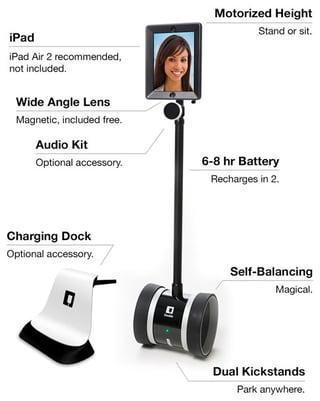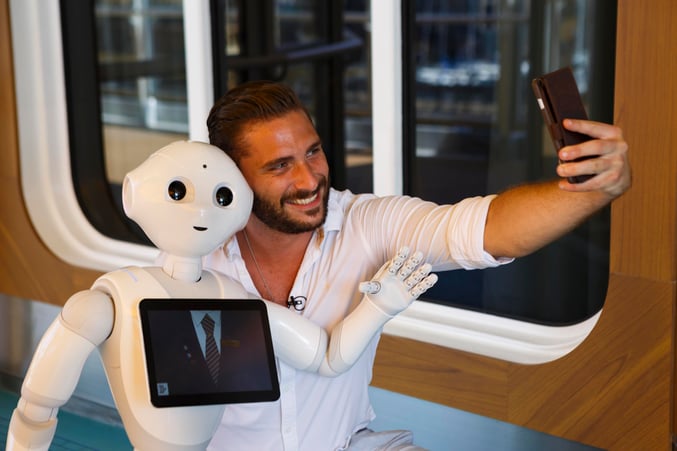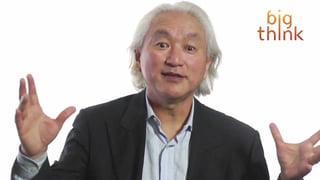Double Robot: Virtual Presence Device for Special Education
 If you have an interest in robots there is a good chance you watch the Big Bang Theory. In one of my favorite scenes, Sheldon, meets the “great and powerful Woz,” Steve Wozniak, co-founder of Apple. Not in person, you understand: no, Sheldon is there only as a voice and face on a virtual presence device: a tall, thin, remotely controlled robot on wheels with a tablet of some sort that projects an image of Sheldon and allows him to see and speak with Mr Wozniak. I have embedded the video directly below this paragraph because I think it important to view before continuing.
If you have an interest in robots there is a good chance you watch the Big Bang Theory. In one of my favorite scenes, Sheldon, meets the “great and powerful Woz,” Steve Wozniak, co-founder of Apple. Not in person, you understand: no, Sheldon is there only as a voice and face on a virtual presence device: a tall, thin, remotely controlled robot on wheels with a tablet of some sort that projects an image of Sheldon and allows him to see and speak with Mr Wozniak. I have embedded the video directly below this paragraph because I think it important to view before continuing.
- 0 Comments
- Sep 15, 2016 6:49:54 PM
- Posted by Mike Nardine
- Topics: double robot
Pepper the sailor Robot
![]()
![]()

Welcomed Onboard Costa Diadema, flagship of the Costa Cruises fleet, Pepper and crewmember Take A Selfie.
Pepper robot, the world’s first emotional robot, keeps extending its employment range. Designed at first as a sympathetic companion for the lonely, Pepper is now working in lines that require a robot with the ability to listen to and put up with multiple humans. After discovering that Pepper the robot is now working for the French railway system, it comes as no surprise to find the robot preparing to become a mariner... No, not a space probe; the ancient type of mariner: like the guy in the poem with the albatross around his neck (in the image above Pepper has a tie around his virtual neck); a sailor on board a ship.
- 0 Comments
- Aug 23, 2016 3:14:17 PM
- Posted by Mike Nardine
- Topics: Pepper
Seymour Papert, EdTech Pioneer Dead at 88

Seymour Papert, one of the grand old men of educational technology, died last week at age 88. Long before the personal computer and the Internet, long before this generation’s computer heroes like Bill Gates and Steve Jobs brought the digital age to the classroom, Seymour Papert and his colleagues realized that computers would change education. They developed the first computer language for children in 1967.
- 0 Comments
- Aug 21, 2016 6:30:10 PM
- Posted by Mike Nardine
- Topics: Seymour Pappert
Apple's Swift Programming Language Comes To The Playground
Until recently Apple’s icons were a colorful, friendly bunch: like the original classic  apple logo with a bite out of it; the wonderfully expressive--if silent-- speech bubble. But the latest arrival, Byte the Swift Playgrounds’ hero, while every bit as colorful, is built like the mating result of a hammerhead shark with a pear; it looks like the digital incarnation of a child’s nightmare. Yes, Yes, I know, kids will probably love it!
apple logo with a bite out of it; the wonderfully expressive--if silent-- speech bubble. But the latest arrival, Byte the Swift Playgrounds’ hero, while every bit as colorful, is built like the mating result of a hammerhead shark with a pear; it looks like the digital incarnation of a child’s nightmare. Yes, Yes, I know, kids will probably love it!
- 0 Comments
- Jul 21, 2016 8:37:29 PM
- Posted by Mike Nardine
- Topics: code
- Posted by Mike Nardine
- Topics: NAO
Dr. Michio Kaku: Robots Take Jobs...But Not From Teachers
At the June 27, 2016 ISTE famed futurist Dr Michio Kaku spoke to the assembled  educators about the coming “digitization” of many industries. He thinks it is only a matter of time--and not much time at that!--before many--maybe even most-- jobs now held by humans will be handled more cheaply and efficiently by robots. If my own past is any guide, I think he’s right. But he was also quick to point out that there were some jobs that he didn’t see replaced by artificial intelligence any time soon--if at all. Teaching, Dr Kaku believes, is one of those jobs. So far nothing digital has appeared on the horizon that looks likely to replace the classroom teacher. I’ve had reason to agree with him there too...
educators about the coming “digitization” of many industries. He thinks it is only a matter of time--and not much time at that!--before many--maybe even most-- jobs now held by humans will be handled more cheaply and efficiently by robots. If my own past is any guide, I think he’s right. But he was also quick to point out that there were some jobs that he didn’t see replaced by artificial intelligence any time soon--if at all. Teaching, Dr Kaku believes, is one of those jobs. So far nothing digital has appeared on the horizon that looks likely to replace the classroom teacher. I’ve had reason to agree with him there too...
- 0 Comments
- Jul 10, 2016 8:06:11 PM
- Posted by Mike Nardine
- Topics: STEM, ISTE 2016
RobotLAB ISTE 2016 Crew Inspired By Dr Michio Kaku's Keynote Speech
 The momentarily stern-looking gentleman in this image gave the opening keynote address at the recent ISTE (International Society for Technology in Education) conference, June 26 through 29, 2016, in Denver, Colorado. I’m certain his face is familiar, but do you know his name? I didn’t, although I feel like I’ve seen him a thousand times on TV explaining everything from time-travel to warp-drives (neither of which exists, of course; but after he got through explaining them I did finally understand why!). And with his infectious enthusiasm and shock of gray hair, he is hard to miss.
The momentarily stern-looking gentleman in this image gave the opening keynote address at the recent ISTE (International Society for Technology in Education) conference, June 26 through 29, 2016, in Denver, Colorado. I’m certain his face is familiar, but do you know his name? I didn’t, although I feel like I’ve seen him a thousand times on TV explaining everything from time-travel to warp-drives (neither of which exists, of course; but after he got through explaining them I did finally understand why!). And with his infectious enthusiasm and shock of gray hair, he is hard to miss.
- 0 Comments
- Jul 6, 2016 6:37:21 PM
- Posted by Mike Nardine
- Topics: STEM, ISTE 2016
NAO Robot Assists Teaching STEM-Skills In Fort Mill, S.C.
I just came across some school-rating figures that surprised me: according to the personal finance website WalletHub based in Washington DC, South Carolina public schools were rated 45th in the nation in educational quality in 2015. That’s 45th in a field of 51. That’s not a good score. The reason this low score surprised me is that I had recently read an interesting Internet post that described at least one South Carolina school district as very up-to-date, progressive and STEM oriented. I guess I thought that would be the same for the entire state!
- 0 Comments
- Jun 30, 2016 1:09:33 PM
- Posted by Mike Nardine
- Topics: STEM, NAO
- Posted by Mike Nardine
- Topics: Artificial Intelligence
Presidents Eisenhower and Obama Have Great STEM Legacies
Personally, I can't remember a president since Eisenhower that has tried as hard to inspire young people to undertake a STEM career as has President Barak Obama. And yes, I can remember the Eisenhower Administration and the day Sputnik wen
t into orbit and changed the world forever! John Kennedy’s administration might have set the nation’s course for the moon in 1961, but I doubt we could have achieved that without the impetus provided four years earlier by Sputnik orbiting the Earth.
- 0 Comments
- Jun 23, 2016 3:42:07 PM
- Posted by Mike Nardine
- Topics: STEM
Relevant Posts
Popular Posts
Subscribe to Email Updates
-
I Want To Learn MoreADDITIONAL INFORMATION


